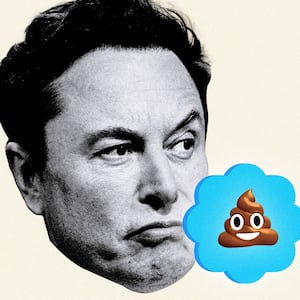Elon Musk is no longer the enigmatic leader behind one of the world’s most well-known automotive brands, Tesla. Rather, he is the face of the destruction of one of the world’s most used social media brands, Twitter.
Since he bought the company in 2022, Musk’s inexplicable tinkering with Twitter (obliterating the verification system, prioritizing anonymous trolls, and letting virulent bigots back on the platform) has chased away both users and advertisers and left the company in dire financial straits.
And Musk continues to personally taint his own image through his prolific and often off-putting tweets. There were a few over the weekend that might rank as his absolute worst.
On the heels of Facebook founder Mark Zuckerberg launching a Twitter competitor, Threads, Musk could have welcomed the healthy competition, and maybe have even thrown in a good-natured barb at his fellow tech billionaire (who he has already challenged to a “cage match” fight.)
Instead, Musk tweeted his desire for a literal penis match—in his own words, a “dick measuring contest”—against Zuckerberg.
Few powerful public figures embody toxic masculinity quite like Elon Musk. Aside from the mere childishness of proposing a battle of the phalluses, this type of rhetoric is part of a sick and dangerous pattern for Musk.
In late 2021, Musk tweeted the acronym TITS amid allegations of sexual abuse at Tesla. A female employee alleged unwanted advances, physical touching, perverse bodily commentary, and a disciplinary report for the victim (and not the alleged abuser).
Let’s not forget the disgusting Nov. 2022 tweet where Musk issued a crude meme featuring Jesus as Donald Trump, praying behind a woman with her dress pulled up, bent over, with the Twitter emblem on her bum. (This was supposedly an attempt to coax Trump off of Truth Social and back to Twitter.)
To the MAGA manosphere, this was a “joke,” one which could only cause offense to humorless snowflakes. But for women who continue to face sexual harassment, sexual assault, and a business culture that still venerates “bad boys,” this isn’t a joking matter.
Musk and Trump aren’t the only practitioners of toxic masculinity online, but they are a couple of the most influential—with tens of millions of followers between them. They and their acolytes fan the flames of objectification of women, laugh haughtily at claims of abuse, and promote a view of manhood that exists only to demean, defame, and disregard women. (There’s even a phenomenon known as “himpathy”—or sympathy towards the perpetrator.)
Sexualizing women and making penis jokes may be all in a day’s work for the world’s richest man, but the consequences run deep.
These types of crude jokes are major HR violations—as they should be. Not only do they foster a hostile environment for women (or anyone who objects to such misogynistic behavior), they represent a huge step back to the days before #MeToo, when women were expected to laugh off such garbage or be labeled “difficult” or “humorless” or worse.
Comments on women’s bodies, weight, and perceived sex appeal (or lack thereof) should all be deemed socially unacceptable. But they should also be absolutely off limits in the workplace (as should the boss proposing penis-measuring contests).
If your workplace is Twitter, and your boss is Elon Musk acting like a pig on Twitter—how can you not feel intimidated? Who wants to be the first to stand up to the bully with $245 billion and 147 million Twitter followers?
Musk is a leader, whether he lives up to the responsibility or not. Young men and boys shouldn’t be shown Musk’s way as the path forward. His antics on Twitter aren’t a measure of a man so much as they are windows into a destructive underbelly of American culture. Manhood isn’t measured by penis size or physically fighting one’s business rival.
And the people who work at Musk’s companies shouldn’t have to put up with his unabashed toxic masculinity.









